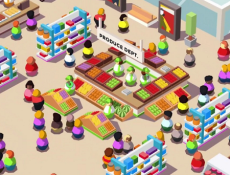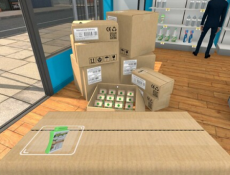

Supermarket Simulator
Supermarket Simulator is a detailed management simulation game where players take the reins of a burgeoning supermarket. The game challenges players to oversee all operational aspects of a grocery store, including product procurement, staffing, customer service, and financial management. Through realistic scenarios, the game provides a granular look at what it takes to run a successful retail business.
Inventory Management and Supplier Relations
Effective inventory control is pivotal in Supermarket Simulator. Players need to maintain optimal stock levels to satisfy customer demands without overstocking and incurring losses. The game requires players to engage with a variety of suppliers to ensure a diverse product range and competitive pricing. Strategic purchasing decisions, such as buying in bulk, timing purchases based on seasonal trends, and negotiating supplier contracts, are critical for maintaining profitability and store reputation.
Customer Satisfaction and Store Operations
Ensuring customer satisfaction is a key focus in Supermarket Simulator. Players must manage various aspects of store operations, from the layout that optimizes foot traffic to the cleanliness and organization of the store. Hiring competent staff, training them, and assigning duties effectively are essential tasks. Additionally, implementing efficient checkout processes and addressing customer complaints promptly play a significant role in enhancing customer satisfaction and loyalty.
Marketing Strategies and Growth
To attract new customers and retain existing ones, players must devise and implement effective marketing strategies. This includes promotions, discounts, loyalty programs, and advertising campaigns. As the store becomes more successful, opportunities for expansion arise, such as opening new store locations, adding more product categories, or renovating existing spaces to accommodate more customers and provide a more pleasant shopping experience.
Financial Acumen and Strategic Planning
Supermarket Simulator also puts players’ financial acumen to the test. Players are required to manage the store’s finances meticulously, which involves setting budgets, forecasting sales, managing debts, and ensuring profitability. Financial reports and analytics tools within the game help players make informed decisions and strategize for long-term growth.
Challenges and Dynamic Market Conditions
The game introduces various challenges that mimic real-life retail hurdles, such as economic downturns, changing consumer behaviors, and competitive market dynamics. Players must stay agile and adapt their strategies to overcome these challenges and ensure the store’s survival and success in a competitive market.
Supermarket Simulator offers a rich, immersive experience for those interested in the intricacies of retail management. The game combines detailed management mechanics with strategic gameplay, providing players with a comprehensive understanding of running a supermarket. Whether it’s optimizing the supply chain, enhancing customer service, or expanding the business, Supermarket Simulator provides a robust platform for budding entrepreneurs to hone their management skills.
Tips for Mastering Supermarket Simulator
1. Craft a Dynamic Store Design:
Revolutionize your store’s layout by adopting psychological insights into shopper behavior. Experiment with sensory marketing techniques, like placing freshly baked bread near the entrance to entice customers with inviting aromas, or using color psychology to influence purchasing decisions. Adjust the placement of shelves and aisles to create an intuitive shopping flow that subtly guides customers through high-margin areas.
2. Precision in Inventory Tactics:
Adopt a data-driven approach to inventory management. Use advanced analytics to track sales patterns and automatically adjust orders in real-time, ensuring optimal stock levels of high-turnover products while minimizing waste. Explore partnerships with local producers for fresh goods, which can reduce lead times and improve inventory freshness.
3. Refining the Customer Journey:
Transform customer interactions by integrating technology in-store. Deploy interactive kiosks where customers can check product information and availability, or introduce an app that customers can use to scan products for instant checkouts. Such innovations not only enhance customer satisfaction but also streamline operations.
4. Workforce Optimization:
Implement an AI-driven scheduling system that predicts peak hours and schedules staff shifts accordingly, optimizing labor costs and ensuring customer service is never compromised. Invest in employee satisfaction programs that increase staff morale and reduce turnover, as happy employees often lead to happy customers.
5. Promotion with Precision:
Utilize machine learning algorithms to personalize promotions and discounts based on individual customer purchasing habits captured through loyalty programs. This method ensures that promotions are relevant, timely, and more likely to convert to sales, providing a better return on promotional expenditures.
6. Curate an Eclectic Product Mix:
Regularly refresh your product lineup with exclusive, limited-time offerings to create a sense of urgency and draw in regular visits. Consider introducing an international food section or a local artisan corner to differentiate your market from competitors and cater to diverse consumer tastes.
7. Leverage Digital Marketing:
Develop a robust digital marketing strategy that encompasses SEO, content marketing, and social media engagement to build a strong online presence. Host live events or workshops that can be streamed on various platforms to engage with the community and drive traffic to your store both online and in-person.
8. Strategic Financial Management:
Utilize financial forecasting tools to simulate various business scenarios and their financial outcomes. This will allow you to better prepare for future investments or unexpected economic shifts. Regularly reviewing financial dashboards will keep you informed and ready to act swiftly to maintain your market’s financial health.
Implementing these cutting-edge strategies in Supermarket Simulator will not only enhance your gameplay but also provide a richer understanding of the complexities involved in modern retail management. These tactics are designed to push the boundaries of traditional retail thinking and encourage players to innovate continuously.
























